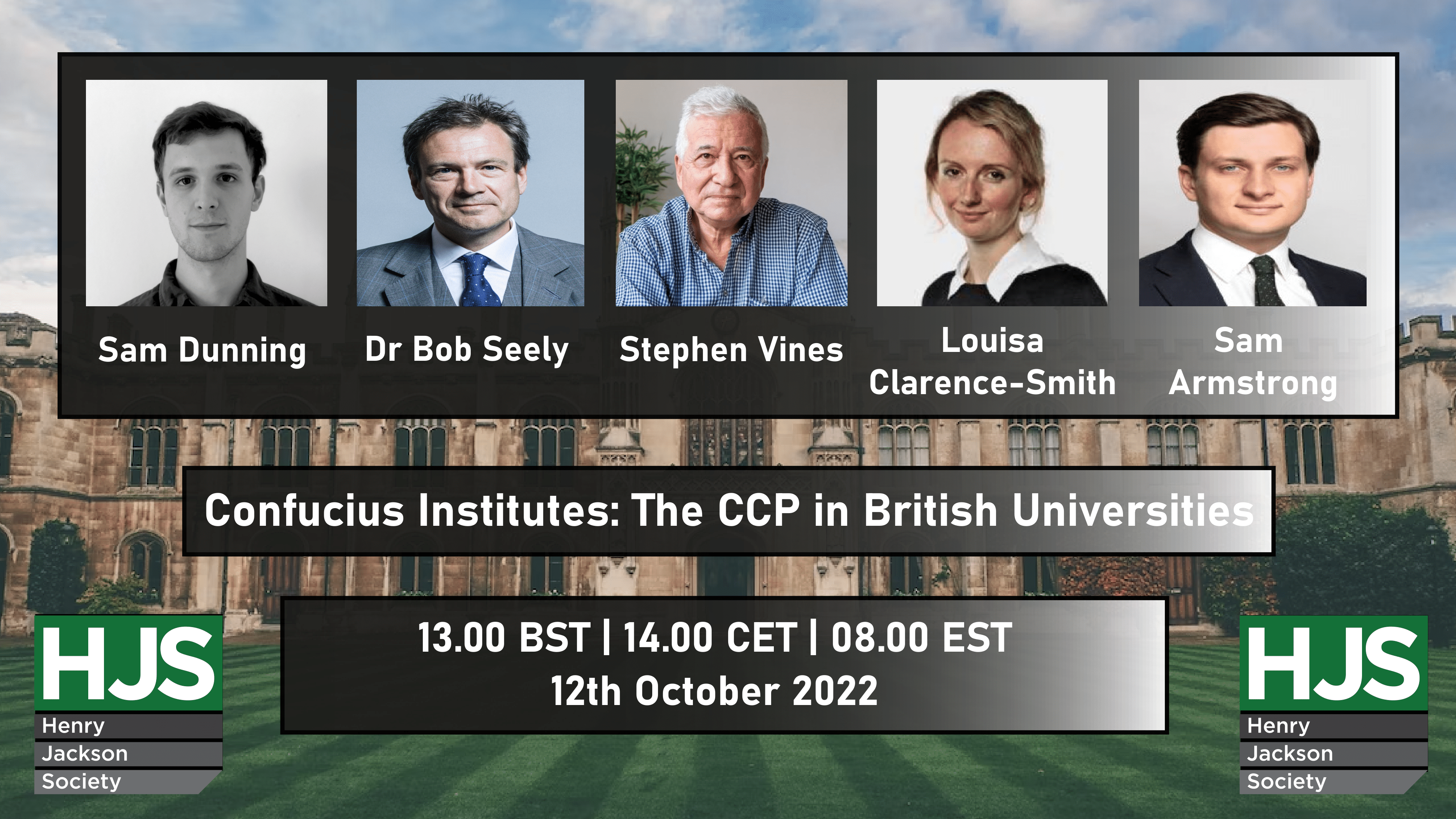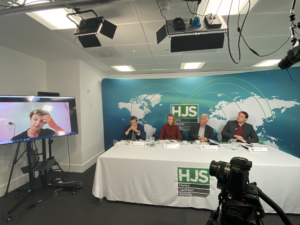Confucius Institutes: The CCP in British Universities

- This event has passed.
Confucius Institutes: The CCP in British Universities
12th October 2022 @ 1:00 pm - 2:00 pm

Criticism of Confucius Institutes has grown over the past decade and a policy intervention in the UK now seems inevitable. But what are Confucius Institutes, what do they do, and why does it matter? A new investigative report written for the Henry Jackson Society by Sam Dunning and Anson Kwong provides answers. The report is based on a campaign of Freedom of Information requests to universities, bilingual OSINT research, and off-the-record interviews. It reveals that Confucius Institutes are engaged in a wide variety of activity beyond their supposed remit of ‘language and culture’: from co-operating with groups adjacent to the CCP’s United Front Work Department, to setting up sensitive science and technology partnerships with China, from offering commercial services including acupuncture sessions and business consultancy, to making political donations and staging events in Parliament.
Critically, the authors of the report argue that Confucius Institutes are unlike other ‘soft power’ initiatives such as the British Council. Their position within universities gives Confucius Institutes license to trade on prestigious reputations. It allows them to diversify their activity with minimal supervision. Above all, it enables them to win influence and shape narratives inside the academy, poisoning the well of academic knowledge about China and deepening the higher education sector’s dependency on the country. Concerns about the likely unlawful nature of Confucius Institutes’ recruitment processes make it clear: the difference in values between the CCP and the Western academy are so great as to make genuine partnerships between the two entirely unsustainable.
Join the Henry Jackson Society for a discussion of the report’s findings, their ramifications, and how best to draw up a policy response.

Sam Dunning is a freelance researcher and journalist with a special interest in China. He is a co-author of the Henry Jackson Society’s report “The Long Hand of Academic Oppression How the CCP uses Confucius Institutes in the UK”.

Bob Seely is the Member of Parliament for the Isle of Wight. He sits on the House of Commons Foreign Affairs Select Committee. Dr Seely writes academically and journalistically on foreign affairs as well as more generally on non-conventional and new forms of conflict. Prior to his election in June 2017, Dr Seely served on the Afghanistan, Iraq, Libya and ISIS campaigns as a member of the Armed Forces. From 1990 to 1994, Dr Seely lived in the Soviet Union and post-Soviet states. His academic and foreign affairs writing is available online at: https://kcl.academia.edu/RobertSeely. Dr Seely has written one of the few peer-reviewed definitions of Contemporary Russian Conflict Strategy available in the West and holds a PhD in Russian military strategy.

Stephen Vines is a journalist, writer and broadcaster who worked in Hong Kong for 35 years before leaving in 2021 to escape the consequences of the draconian National Security Law. He was the presenter of the public broadcasters’ last surviving TV current affairs show before the purge and was a correspondent for The Sunday Times. The Observer, The Guardian, The Daily Telegraph, The Independent and the BBC. His most recent book is Defying the Dragon: Hong Kong and the Worlds’ Largest Dictatorship.

Louisa Clarence-Smith is the education editor for The Telegraph. Prior to this role, she served as chief business correspondent at The Times. Her main areas of focus are government relations with business, trade and M&A. In 2021, she was named Young Journalist of the Year at the Wincott Awards for business, economic and financial journalism.

Sam Armstrong is a journalist that previously served as Director of Communications at the Henry Jackson Society. Before this, he worked as Chief of Staff to a Conservative Member of Parliament and in the Conservative Party’s anti-UKIP division.
An experienced broadcast commentator in his own right, Sam has appeared on all of the UK’s major news outlets. His comments have also been covered in the UK’s major newspapers – often on the front page. Samuel offers expert insight to broadcast outlets on a wide-ranging brief of domestic, security and foreign policy matters.
Sam also coordinates the strategy and communications of the Inter-Parliamentary Alliance on China, the global alliance of bipartisan parliamentarians concerned about the conduct of the Peoples’ Republic of China. He’s often asked to advise legislators around the world on policy responses to the CCP.
Sam Armstrong holds a degree in History and Politics from the University of Nottingham.
***
EVENT SUMMARY

The Henry Jackson Society was pleased to hold a discussion on Sam Dunning and Anson Kwang’s new report on China’s Confucius Institutes and their activities within British universities. James Spencer began the discussion by introducing the speakers. Bob Seely MP highlighted the danger Confucius Institutes pose to Chinese students studying in the UK and their right to freedom of speech and a right to explore education freely. Sam Dunning discussed some of the recommendations of the report and argued that the values of British universities can never be compatible with those of the CCP and the Confucius Institutes. Louisa Clarence-Smith commented on the UK government’s change of policy since the publication of the report. Stephen Vines argued that Britain has moved past the ‘golden age’ of relations with China, and that the government’s new toughening up on the institutes is emblematic of a wider change in China policy. Finally, the speakers answered questions on who could replace Confucius Institutes in Mandarin provision in the UK, the role of Brexit in universities replying on Chinese funding, and the future of the British Council in China.
RELATED EVENTS
British General Election Campaigns 1830-2019: Can The Past Inform The Future?”
The British general election is the linchpin of our liberal democracy, and its results are often fundamental to how we live. With the next UK general election looming, there is therefore … Continued



